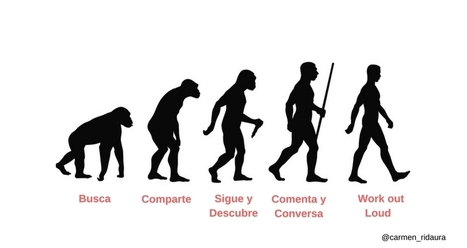 Your new post is loading...
 Your new post is loading...
Of all the things you learned in school, chances are the right way to learn wasn’t one of them. To make it through academic life, most of us opt for what psychologists call “massed practice,” better known as cramming: It’s Monday and your test is Friday, so you save studying for the night before. One four-hour session can nab you a passing grade, so why not? Well, because that’s not how your brain likes to absorb information. You might remember enough to pass your exam the next day, but just a week or two later and the details will already be fuzzy, if not gone completely. Here’s how to do better.
Via The Learning Factor
Companies want to be profitable and maximize their performance and impact both in the world and within their industry. With that said, accomplishing those feats starts with cultivating a culture to allow those things to happen which starts with a priority on employee well-being. Culture is important -- it affects engagement, mindset, reputation, recruitment of talent, and well being. When looking to cultivate a healthy and high performing culture, start by emphasizing these six points:
Via The Learning Factor, Mark E. Deschaine, PhD, Bobby Dillard
Find it hard to advocate for yourself? You’re not alone. The personality trait that psychologists call “agreeableness” describes how motivated you are to get along with other people. If you’re highly agreeable, that motivation can sometimes prevent you from sticking up for your own interests. Anytime you ask for something at work, you run the risk that you’ll be told “no”–and possibly aggravate the person you’re asking. As a result, agreeable people may be put off from asking in the first place. This can be a problem, because research suggests that agreeable people tend to make less money than disagreeable people (even accounting for the fact that disagreeable people lose their jobs more often). And in leadership roles, agreeable people may not be as good at getting their teams all the resources they need. So what can you do to be more assertive even when it just isn’t in your personality to do so? Here are a few tips.
Via The Learning Factor
We’ve all had those days: You’re under pressure to get things done, but you can’t seem to accomplish anything. There is still hope. Here are a dozen strategies you can put to work immediately to help you salvage your day and get more done.
Via The Learning Factor
Packing your beach bags? Firing up a grill? Now’s the time for leaving work concerns at work and skipping off someplace where you can relax, regenerate, let loose, and just have fun. The idea of doing anything that even remotely reminds you of your job probably doesn’t seem too appealing—and that’s fine. But even so, your vacation doesn’t have to be dead time when it comes to self-improvement. Before you roll your eyes and click or swipe out, there’s good news: You can boost your skills while relaxing and de-stressing. In other words, your vacation can be a great time to improve your emotional intelligence—and still thoroughly remain in vacation mode. Since that’s one of the most important job skills on the market right now, it’s worth taking a page or two from the most emotionally intelligent vacationers’ play books.
Via The Learning Factor
Few acts are a divisive as public speaking, as half of us want to be on the big stage and half of us want to stay away from it as much as possible. As Jerry Seinfield once observed, more people fear public speaking than death: "If you had to be at a funeral, you'd rather be in the casket than doing the eulogy." Here's a secret, though: Professional public speakers know a bunch of things that people avoiding the stage do not understand. As I've done more speaking, I've discovered some fascinating knowledge most people don't realize.
Via The Learning Factor
There’s a growing body of research about how counterproductive multitasking can be. While we may feel like we’re getting more done, the reality is that regular multitasking can leave us with a diminishing ability to focus. That’s good to know. But if you’re a chronic multitasker who finds it hard to focus, is there any hope of getting your attention span back? While neuroscientist Daniel Levitin, psychology professor at McGill University in Montreal and author of This Is Your Brain on Music: The Science of a Human Obsession won’t speak definitively for everyone, he says there are some general things most of us can do to improve our focus. Put these practices into place to sharpen your concentration and be more effective.
Via The Learning Factor
Feeling stressed lately? Chances are you're not alone. We carry varying degrees of stress around with us all the time—sometimes more, sometimes less. Does that pressure make us more productive or less? As with so many aspects of human psychology, the answer is: It depends. But what it depends on is something called the Yerkes-Dodson curve, a theory that dates back to 1908. Here's how understanding it can help you channel the stress you may be feeling into energy to get things done. The Yerkes-Dodson curve relates the amount of motivational energy, called "arousal," a person may possess to how well they'll perform at a given task. The basic idea is that at low levels of arousal, people don't perform particularly well. In this state, people aren't all that motivated to get much done. That helps explain why being totally stress-free can breed laziness or complacency, and also why some of your most productive days are those when the clock is ticking for you to wrap up a big projec
Via The Learning Factor
In a society roided-out on bling, cash, ego, nakedness, and status, we have lost our authenticity. We have lost morals and what it means to be ourselves. So many are caught up in following the crowd they have gotten lost in it. How can any type of true success come from being a follower? Followers are lost to their authenticity and are chasers of "status" and "wealth." Followers are competitive, insecure, and consistently positioning and provoking to one-up each other. The stand-out successes we all admire are not in the crowd, they aren’t chasing cash, or being cool. It doesn’t mean they don’t love nice things or indulge in them; it means they approach success from a different mindset.
Via The Learning Factor
Performance reviews have been reportedly going extinct for quite some time. But they aren't completely in the grave yet, and maybe they shouldn't be. Despite the dread with which many employees greet their year-end evaluations,psychological studies have shown that people still generally find them useful—as long as those reviews offer a chance to discuss relevant issues, outline key objectives, and provide constructive feedback. But for that to happen, you need to go in prepared. In fact, you may think the biggest factor in your success is how you perform throughout the year, but your manager may know less about how well you're actually performing than you may hope—meaning your annual review might count for more than you imagine. That can be good news for you, though. These are three tips, based on some fundamentals of human psychology, to help tilt the field in your favor.
Via The Learning Factor, Kevin Watson
As my fellow Inc.com columnist Michael Simmons has pointed out, all incredibly successful people share one common trait: They're constantly learning. Elon Musk, Oprah Winfrey, Bill Gates, Warren Buffett, and Mark Zuckerberg all make space in their super demanding schedules to ensure that each week they're just a little bit smarter than they were the week before. You might not have time to go back to school or read a library's worth of books, but you most certainly have time for the techniques below, which can help you keep learning no matter how busy you are
Via The Learning Factor
Trabajar en red, una de las competencias digitales clave para la transformación digital que venimos oyendo cada vez con más frecuencia y de la que todo apunta a que todavía nos queda mucho por escuchar. Una de las modalidades más desconocidas de trabajo en red es la conocida como trabajar en voz alta o en…
Via Carmen Ridaura
juandon Necesitamos planteamientos metodológicos, como dice Alfredo Prieto, pero también y especialmente, estructurales, como señalamos en nuestras investigaciones para no solo innovar en la educación, si no para transformarla.( ejemplo:... “Las personas usan historias para organizar, expresar y recordar sus experiencias. Esta idea es el fundamento de un método desarrollado por Roger Schank…
|
If you’re constantly frazzled on the job, logging super-long hours with little to show for it at the end of the day, chances are good that you’re mismanaging your time. But the good news is it’s easy (enough) to reorganize your schedule and get back on a successful track, stat! “There’s a lot coming at us: mail–and [all kinds of] paper in general–emails, texts, phone calls, bosses calling for help, deadlines, projects–it doesn’t stop,” points out Felice Cohen, organizer and author of 90 Lessons for Living Large in 90 Square Feet (or More). No wonder so many of us get so behind and feel so exasperated. But it doesn’t have to stay that way. The answer isn’t to do more. “Not everyone can multitask, and most of us who do probably shouldn’t,” says Cohen. Rather, the answer is to do what you do smarter. And here’s how.
Via The Learning Factor
We might spend days, months, or even years trying to figure someone out. Is he who he says he is? Should I trust her? The wheels in our head spin as we think of all the variables and how they'll play out. And still, we keep hearing that we should just listen to our instincts. Complicated questions, simple answer. What should we do, and where did this whole idea of the gut instinct come from, anyway? Intuition isn't some magical, mysterious quality that we carry with us. It actually comes from the knowledge and past experiences that we all carry. Even if we're unable to explain why we feel the way we do, there's a logical explanation behind our gut feelings. Whenever you encounter anything new, the unconscious side of your brain is constantly making assessments. It takes in certain cues, such as a smile or parts of a story, and then matches it with something similar in our database of memories to come up with a conclusion. Meanwhile, our conscious side remains unaware of this rapid process taking place.
Via The Learning Factor
No matter where you are in your career, it’s only natural to occasionally feel as though there are things you’d like to change. But it’s one thing to say you want to make a change and quite another to actually make it happen. In order to make serious steps toward reinventing yourself, you need to first commit to it and then take action to make those changes a reality. Here are twelve ways you can reinvent yourself at work and in your personal life, backed by science.
Via The Learning Factor
What’s the point of networking if not to get other people to like you? Sure, you need new contacts to see you as interesting, competent, professional, and potentially valuable to them—but if they don’t also find you likeable, nobody will feel motivated to reach out later and work with you. The reason why all comes down to emotional intelligence, the set of skills and qualities that allow people to form deeper, closer relationships with others. Likability is a key ingredient in that, and its career benefits are pretty obvious. For instance, being likeable—and liking your coworkers in return—can increase your chances of getting promoted. But when it comes to first impressions, you don’t always have much time to get people to like you. So here are a few straightforward things that the most emotionally intelligent people do to cement their likability from the get-go.
Via The Learning Factor
We get it, finding a mentor can be difficult and time-consuming. But when you do find one (or two), they can save you from making costly mistakes that can set you back in your career. Simply put, having a mentor will improve the quality of your decisions and provide opportunities that won’t be available to you otherwise. There’s this idea that that mentors are older people with established careers and well-honed skill sets who provide guidance to younger mentees, but this isn’t always the case. The key to success is selecting the mentor who best suits your needs at any given stage of your career: entry level, middle management level, or executive level. If you’re an entrepreneur or creative person, you can think of these stages as early career, mid-career, and advanced career.
Via The Learning Factor
How you spend your night can have a huge impact on the day that follows. Do you spend your time ruminating over issues? Or maybe you stress over something that didn't quite go right during the day. There's no doubt, how you think affects how you feel. This is particularly important at night as you try to unwind and prepare for rest. This sets you up for sleep which serves many vital purposes. When I look at my clients who achieve the most during their days and are happiest, they are the ones who have a healthy routine at night. They set themselves up for success the following day by thinking and acting in a particular way.
Via The Learning Factor
The internet is chock full of daily habits that will help your routine, but what about bad habits? Because habits are so ingrained into our daily routines, we often don't notice how harmful ones sneak in and ruin our success. Try eliminating the following habits from your life and see how your success in business and in life improve:
Via The Learning Factor
The future of work is all about innovation and agility. We have to be prepared for ever-changing circumstances, and that means being open to learning new things. Learning is no longer something we just do in schools. We can't rely on just the skillset we knew when we entered the workforce--that will guarantee career stagnation. So I decided to sit down with Dr. Josh Davis, the Director of Research and Lead Professor for the NeuroLeadership Institute, an organization devoted to using science to advance leadership potential. NLI has recently been exploring how to make ideas stick. Through their research, they created a model outlining four key conditions for effective learning: Attention, Generation, Emotion and Spacing (AGES).
Via The Learning Factor
Say you’re a high performer who's risen through the ranks. Now you have even bigger responsibilities. Or you're working your way toward a promotion and need to show your skills and professionalism in the best light. Then the phone call comes. The results of your medical tests weren't good. Or you suddenly have to take care of a loved one in an emergency. Or there's an unexpected financial hit that could spell catastrophe. Whatever the situation, your life just got much more complicated. While intuitively you know that these things can happen to anyone, the anxiety of dealing with such troubling events, coupled with the pressure to continue to perform in your job, amps up the stress to DEFCON 1. "A curveball like that requires sharpening your coping skills and expanding them so that you can deal with what’s being demanded of you," says clinical psychologist Alicia H. Clark, adjunct professor at the Chicago School of Professional Psychology. And there is a strategic approach you can take to help you cope and perform better, even when you’re operating under extreme stress.
Via The Learning Factor
There's no shortage of procrastination cures out there, but few of them come with the sort of detailed instructions that make them easy to put into practice. Be kind to yourself, suggest psychologists, for instance. Which sounds nice, but if that were simple to do, most of the nation's therapists would be out of business. Try breaking the task down into itty-bitty, totally non-threatening action steps, says another common piece of advice. That also makes a ton of sense, but we all know the human mind is hard to control. You can tell yourself you're only going to write 200 words to get started on that book project, but your brain often does an end run around your intentions, paralyzing you with visions of savage critics and blown deadlines nonetheless. Suddenly, you're looking at cat pictures yet again.
Via The Learning Factor
With the start of a new academic year swiftly approaching (I realise many have already started, sorry) I am again having discussions with academics on the best way to use the spaces they’re given. It’s not only about the size or resolution of the screen/projector. It’s not about the fact there is always a spot-light right above the screen which makes it so difficult to see the content. It is about whether the space is too cold or hot. It is about whether there is enough natural light, or is it annoying neon strip lights? Is there (enough) power sockets spread around the space so trailing wires aren’t a trip hazard? Can students get in and out of the room and seats quickly to enable a quick or easy change between classes? What about the spaces outside the classroom – does the next class block the exit as they hover outside waiting to get it?
Via Marta Torán
So part of the reason I am keeping this blog is so I can share with you the research I am undertaking as part of my doctoral studies. Writing about the ‘stuff’ that I have been reading …
Via Carmen Ridaura
|



 Your new post is loading...
Your new post is loading...














































Now I understand my preparation process for any event or task i take on..."The “spacing effect” is one of the most consistently replicated mental processes in psychological history, dating back to Hermann Ebbinghaus, who observed it in 1885.
A four-hour marathon study session (or team meeting or conference presentation) demands a ton of sustained attention, the quality of which will inevitably dwindle the longer those periods last. It simply makes more sense, cognitively speaking, for teams to opt for small doses of high-quality learning–sessions lasting under an hour, with lots of discussion and participation–to make insights stick without taking up much time.